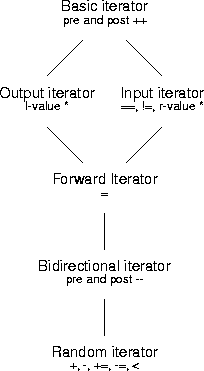- iterator types
- there are five types of iterators arranged in an hierarchy
-

- each type adds operators to the previous type
- all iterators respond to pre and post
++
-
++itr - advance the iterator itr to the next element and
return the newly advanced iterator
-
itr++ - remember the iterator itr, advance itr to the
next element and return the old itr
- input iterators (read iterators)
- the equality operators
== and != - tests if two iterators
refer to the same value or two different values
- be careful - it's not a test of the values being referred to
- r-value
*itr - return the value being referenced by the iterator
itr
- it's called r-value
* because it can only appear on the
right-hand side of an assignment statement - if itr is an
input iterator, than
-
i = *itr; is correct because * is being used to read
itr
-
*itr = i; is incorrect because * is being used to write
itr
- output iterators (write iterators)
- l-value
*itr - return the location being referenced by the
iterator itr
- it's called l-value
* because it can only appear on the
left-hand side of an assignment statement - if itr is an
output iterator, than
-
i = *itr; is incorrect because * is being used to read
itr
-
*itr = i; is correct because * is being used to write
itr
- forward iterators (read-write iterators, or unidirectional iterators)
- all the operators for both read and write iterators and assignment
- bidirectional iterators
- all the operations for forward iterators
- pre and post
-- - for moving the iterator back to the previous
value
- random iterators
- all the operators for bidirectional iterators
- iterator-integer addition and subtraction
-
x = *(itr + 5), x = itr[5]
- addition- and subtraction-assignment
+= and -= for jumping
around
-
itr += 5
- iterator-iterator subtraction for finding distances between iterators
-
cnt = end_itr - start_itr - 1;
- just as with pointers, the two iterators being subtracted must be
from the same container for the subtraction to be meaningful - but
the compiler doesn't (can't) check to make sure
- the
< operator - does one iterator refer to a value earlier in
the sequence than another iterator
- the iterator hierarchy
- why not just make all iterators random
- principle of least privilege
- not all containers can support all iterator operations efficiently
- iterator adaptors - insert iterators
- the problem:
copy(src.begin(), src.end(), dst.begin()); doesn't
work - just iterators can't change container size
- the solution - insert iterators, behave like iterators, but can change
container size
- they are template classes
- the template parameter is the container type
- the constructor argument is the container and possibly an iterator
- there are helper functions that make declarations easy
- three inserters - back inserter, front inserter, and general inserter
- back inserter - insert elements at container end
- class
back_insert_iterator<typename T> bi(C)
- helper function
back_inserter(c)
- when assigned to, calls C
.push_back(V)
-
push_back()
- front inserter - insert elements at container front
- class
front_insert_iterator<typename T> fi(C)
- helper function
front_inserter(c)
- when assigned to, calls
C.push_front(v)
-
push_front()
- front inserter - insert elements somewhere in the container
- class
insert_iterator<typename T> ii(c, p)
- helper function
inserter(c, p)
- when assigned to, calls
C.insert(p, v)
- the inserter points to the new element when done
- iterator adaptors - input and output iterators
- i-o streams are like sequential containers - a sequence of values
- treat i-o streams like containers - iterator access in paritcular
- simplify and unify container i-o
- input and output iterators turn i-o strems into iterator accessable
containers
- they are template classes
- the template parameter is the type of the value being read or written
- the constructor parameter is the stream involved
- helper functions aren't provided
- ostream iterators
- class
ostream_iter<T> oi(ostream, delim)
-
delim is optional, put between successive elements; it has type
const char *
- example -
copy(ivec.begin(), ivec.end(), ostream_iter<int>(cout, " "))
- the operator
<< must be defined for values of type T
- istream iterators
- like ostream interators, but there's the eof problem, and the error
problem
- use the default constructor to return an eof indicator
- example - class
istream_iter<T> ii_eof()
- class
istream_iter<T> ii(istream)
- the next iterator after an eof or error is the eof iterator
- example -
copy(istream_iter<int>(cin), istream_iter<int>(), back_inserter(ivec))
- the
>> operator must be defined for the value being read
This page last modified on 1 November 2001.
